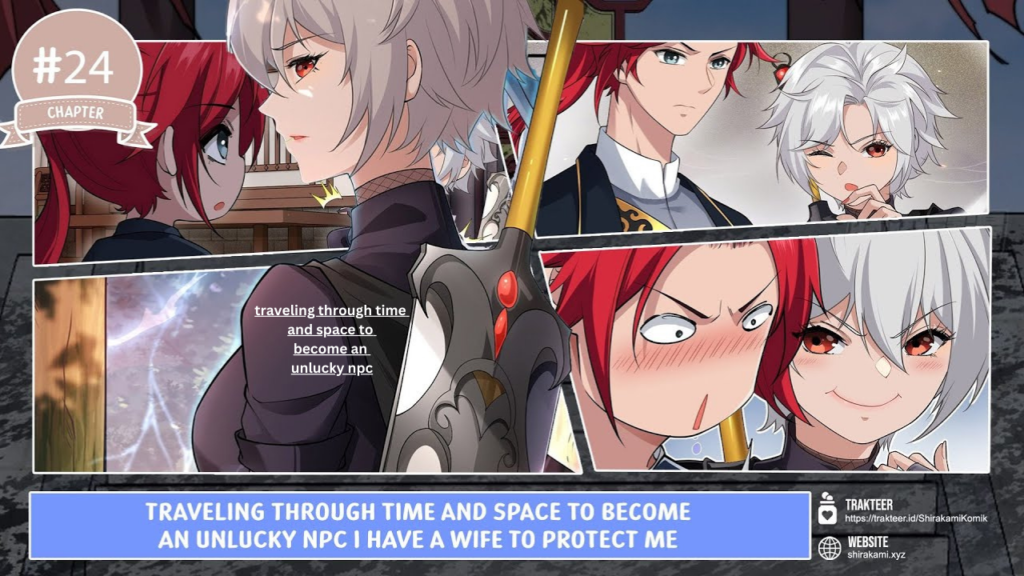Traveling through time and space to become an unlucky npc. The concept of traveling through time has been an intriguing idea for centuries by offering one a possibility to beat the laws of physics. From ancient civilizations to correct wrongs of yesterdays, visiting what technologies exist by the future age, we wonder what we would feel like in those scenarios. What if, however, in the vastness of time and space, you’re not the hero? If instead, you landed in the scenerio of becoming an hapless NPC or non-playable character, a minor player in a world of heroes and villains?
This has certainly captured both the minds of philosophers as well as creators in recent times, popular among gamers, literature writers, and pop culture aficionados. We will consider the path time and space travel, the nature of non-player characters, and a rising popularity in stories based on the “unlucky NPC” trope. Let’s see why this approach has much to appeal to modern audiences and also reflects our attitude toward life, society, and the role played by fate.
Understanding Time and Space Travel
Traveling through time and space to become an unlucky npc. Before we get into the heart of NPC, let’s separate science fiction from factual things to do with time and space travel. Time and space have two concepts often paired together yet are distinct in what their mechanics really do and how they impact things.
The Time Travel
Time travel is theoretical movement between different times, similar to, of course, space travel. Most of the time travel theories involve travels to either the past or to the future, with some rules or paradoxes attached to it. This, in fact, was also attempted by famous physicists such as Albert Einstein in their propositions on time travel, giving an explanation that time is not fixed as one dimension but rather elastic and can be dependent on gravity and speed among others.
Fiction picked up on these scientific theories and discovered a variety of ways to travel through time: machines, such as H.G. Wells’ The Time Machine, through natural portals, or even the sheer force of will or accident, like in Doctor Who and Back to the Future. Stories have been wrestling with the moral and existential questions that surround traveling in time: can you change the past? Should you, and what happens if you know something in advance?
Space Travel
Space travel describes the transfer between different parts of the cosmos, covering vast distances which are beyond human means. With the existence of space exploration in reality, man today is aware of much more concerning the cosmos, yet the imagination of humanity is full of science fiction on space travel. Space travel always implies breaking the limits of physics, moving beyond light speed, or using wormholes (bridges through space-time) for traversing the universe.
Because space travel usually goes hand-in-hand with time travel, it could mean that moving through light-years might mean the dilation of time (where time moves more slowly for those traveling at incredible speeds). Consider movies like Interstellar, where the story digs into the phenomenon of returning to a completely different time than when you left due to deep space travel.
The Merge: Time and Space Travel Together
When time and space travel converge in a storyline, endless avenues open. With these avenues, the characters come nearer to other worlds while remaining unshackled by the linear time. In fact, heroes of such stories are often gifted with the power to alter history or pursue interstellar exploration, but for all the players in the game, it might not be so euphoric after all.
Enter the NPC: The Unfortunate Side of Time and Space Travel
In video games, NPCs are the characters that people the world, but unlike the player character (PC), they are only bound by the relatively limited scripts. Traditionally, NPCs have been the back drop to the hero’s journey by performing mundane chores, giving quests or just being part of the scenery. They were meant to be set apart from being heroes.
They are there to enhance the experience of the player, always there, yet not seen or thought of very much. What happens, though, when you do not control the deeds of your character-holding power, making choices, or writing history? What if you are that unfortunate NPC caught in the stream of time and space, without any influence over your destiny?
The Emergence of Stories of the NPCs in Pop Culture
More recent tales about time and space travel, telling the experiences of the NPCs-the little guy, the minor character, the one caught in events that are not his own making. The audience celebrates this with ever-increasing abandon today because it is perceived as a reflection of a growing impotency at the hands of greater forces.
For example, the movie Free Guy (2021) keeps us stuck with Guy – an NPC in a video game who suddenly finds out that he exists and lives in the programming of the game. He at first repeats himself doing the same old boring thing and nobody cares about him, but then when he finds his self-awareness, our opinion on an NPC transforms into something with a possibility to life. Such a strong perception has grown from a character who began as funny but ended up on the path of existential questions: what is an identity, and what is one’s agency?.
Similarly, the genre called isekai or other-world anime, which frequently makes use of the trope of a protagonist being transported to fantasy worlds and thrust into heroic roles, a relatively new subgenre of this has been developed that inverts the notion by depicting the individuals who are not the chosen heroes but rather the unlucky non-player characters fated for obscurity or tragedy.
Such programs as traveling through time and space to become an unlucky npc
– Starting Life in Another World, in which the protagonist is constantly reborn into a world where he’s destined for trial and death time after time before there is finally a way out of the cycle. This dark take on isekai storytelling presents some of the very possible vulnerabilities one will face as an NPC, no power to command or change their world around them.
The NPC Perspective: A Life Out of Control
The unlucky NPC trope evokes because it is somewhat in resonation with real life. We all go about our daily lives, trying to play a part of a much bigger narrative which we have no hand at. Be it global events, societal pressures, or economic forces, we are sometimes background characters in someone else’s story. That’s what the unlucky NPC character symbolizessomeone who had his fate become something he was dragged about, not something he shape.
Since the times of much of life seem pre-ordained by those systems that exceed our control — either politics, economy, or even the unpredictable features of technology changing ever so quickly — in the news of AI’s advent, there seems to be a universal relevance to being an NPC. End This unfortunate character is an outstanding example of the fear of losing control over time and space traveling stories which also raise some important questions regarding the nature of free will and the agency in an increasingly automated world.
The Unlucky NPC in Video Games
Let’s move to video games, where the NPC trope is most literally put to action. In most games, the protagonist is the player, able to make decisions and thus lead plot progression. Meanwhile, most NPCs are walled off to predictable, repetitive lines or actions irrespective of the player’s input.
Most of the NPCs are, after all, free to live relatively normal lives. They will attend to their mundane occupations: farming, blacksmithing, or running a shop. But where there is much bedlam, being an NPC might be fatal. Think of Grand Theft Auto; sometimes, being an NPC means merely to become the unfortunate player in a frenzy of shooting or car racing. The characters may find themselves expendable, with hardly a care about their lives or fates.
While other games do not treat their NPCs this way, certain titles turn the script. Games like Undertale forces a player to reinvent their relationship with NPCs, thereby giving the option of showing mercy or making decisions that change the game-world dynamically. In Undertale, the treatment of NPCs by a player forms a vital part of the game. It makes the protagonist realize they’re far from being a ‘hero.’.
This is something that Cyberpunk 2077 also does; though such NPCs play simply supporting roles, they get backstories that are deep enough, personalities complex enough, and emotional arcs that immerse the player in those personalities. Not being background characters, they all have hopes and dreams and problems of their own – something that enriches every second of the game. The gritty, dystopian setting used makes even the smallest of characters scooped up in the overall forces of a society, unable to escape their eventualities.
Why the Unlucky NPC Concept Seems to Resonate With Contemporary Audiences
Traveling through time and space to become an unlucky npc. So why is the concept of the unlucky NPC so appealing to audiences today? One reason has to do with its appeal – it resonates well. In a society that seems at times chaotic, random, or completely out of everyone’s control, it happens that a vast number of people relate with this feeling of being an NPC in someone else’s story. Life is uncertain and full of randomness, not everyone gets to play the role of “hero” all the time, and a situation where one experiences powerlessness in having no control over being swept along by forces larger than ourselves speaks to lots of modern anxieties about the future, technology, and our place in the world.
Stories of unfortunate NPCs also open new aspects to the age-old trope. In an arena where most genres are represented by heroic plots, the unlucky NPC opens a view that deconstructs the notions of power, agency, and control common to most tales. Stories reflect from the perspective of those often overlooked and/or marginalized.
The unlucky NPC also taps on existential themes. If life were a video game, where some are players and others are NPCs, what does this all mean for free will? Do we all have a predetermined path, or do we have enough capacity to chart our own destinies? This is one of those questions that resounds so loudly in this era of individuals questioning systems of power, control, and fate.
Conclusion: Traveling through time and space as an unfortunate NPC
Traveling through time and space to become an unlucky npc. As we will soon discover, going through time and space to become an unlucky NPC is a strange mix of sci-fi, fantasy, and existential exploration. Whether as video game, anime, or literature, the unlucky NPC offers a new way to look at things in life: the larger forces, those things we can’t master and the ways by which we are formed because of our fate.
Ultimately, these stories remind everyone that everyone, even the background characters, have a story worth telling. A world that’s overwhelming at moments may find this tendency to feel like an unlucky NPC discouraging; it is exactly what makes this story so precious-it reminds us of the nature of life and choice and control. Every role-even the smallest-holds value in the vast expanse of time and space.



